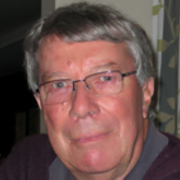
Peter Morritt
London-born and bred, Peter Morritt tossed a coin and moved to New Zealand around the age of 20. By then he had already worked in television: one of his first jobs involved fixing them.
In New Zealand Morritt got a job at radio station 2ZB as a technical operator, working with legendary radio personality Aunt Daisy along the way. Over the next few years he did various technical jobs across radio and television, including maintaining transmitters and installing studio equipment.
By the late 60s, television was keeping Morritt busy. He recalls setting up cables and operating “cameras that weighed a tonne” for live broadcasts of rugby and golf, and handling technical production on current affairs programmes like Compass.
In 1969, after encouragement from producer Des Monaghan, he began directing for Gallery, and in late 1971 took a producers training course. Morritt went on to produce early regional news show Newsview, which played from Wellington six nights a week. Veteran producer Ron Pledger argues that Morritt’s extensive experience across television stood him in good stead as he moved into production. Pledger recalls Morritt’s confidence and a gift for using humour to help diffuse a tense moment. “It was always a lot of fun to have him around.”
In 1973 Morritt began producing in-depth current affairs show Inquiry. The show shot all its stories on film, and opened strongly with a special on NZ’s high number of road deaths.
In the mid 70s Morritt won a bursary to travel overseas, seeing first hand how current affairs was produced everywhere from the CBS network in New York to regional stations in England. He was particularly impressed by legendary newsreader Walter Cronkite: “one of the most admired and respected newsreaders in the business”.
Back in New Zealand, a new second channel had launched. “It was absolutely flat tack go go go for the first three years, until Muldoon decided that the two networks needed their profligacy reigning in!” In this period Morritt executive produced shows whose subjects covered gardening, religion and special interests. He also pulled together six hour-long adventure documentaries under the title Challenge, one of which saw him in Mexico following Kiwis taking part in an international jet boat race.
One of the most memorable of the new shows was Edwards on Saturday, which broadcast live every second week. Fronted by Brian Edwards, the show mixed interviews, music (including many Blerta talents), and a touch of the unpredictable. “Brian was in his prime,” recalls Morritt. “He was coming up with all sorts of ideas, and was prepared to kick ass”. The first episode examined homosexuality, and the second convinced many viewers they were witnessing live psychic surgery.
With episodes sometimes extending to three hours, Edwards on Saturday proved exhausting for all involved. In 1977 many of the show’s creative team moved onto a new consumer rights programme. Fair Go would become one of the longest running shows in the history of NZ television. Morritt was producer and director for the first two seasons. Occasionally there were battles with Television One's advertising department over worries that some of the show’s targets would affect the Network's income. “Thanks to people like Des Monaghan; he would dig his heels in,” says Morritt.
Since Fair Go, Morritt has worked on everything from talk shows (the Edwards-hosted Sons and Daughters) to the stresses of live election coverage, before computers were in wide use. The Ian Johnstone-chaired Questions Please also saw occasional fireworks. Viewers were invited to send in their gripes or discussion ideas, then a team of four guests, ranging from conservative Norman Jones to ex radical Tim Shadbolt, would sit down to discuss them.
Morritt has also directed his fair share of rural shows, including roughly eight years worth of Skellerup Young Farmer of the Year ceremonies, and A Dog’s Show. He has especially positive memories of the latter programme, and its host John Gordon. Setting out into the countryside with a mobile broadcast unit, the crew often shared an evening drink with the “good old back rural country folk” who'd spent the day out on a hillside, attempting to get sheep to follow a dog’s command.
Since leaving television in 1996, Peter Morritt has been enjoying his retirement, and doing occasional IT work for the elderly.
Sources include
Peter Morritt
Robert Boyd-Bell, New Zealand Television - The First 25 Years (Auckland: Reed Methuen Publishers, 1985)